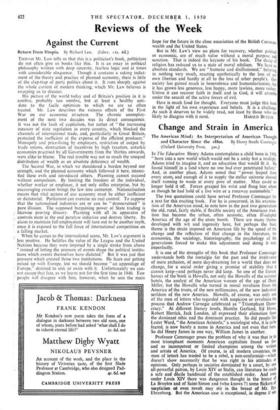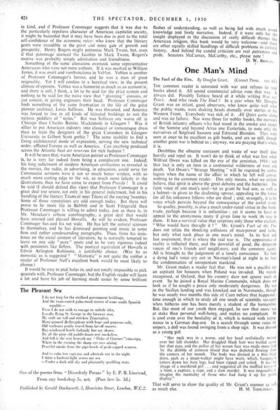Change and Strain in America
The American Mind: An Interpretation of American Thought and Character Since the 288os. By Henry Steele Corninager. (Oxford University Press. 3os.) IN The Education Henry Adams contemplates a child born in 1900, " born into a new world which would not be a unity but a multiple. Adams tried to imagine it, and an education that would fit it. He found himself in a land where no one had ever penetrated before." And, in another place, Adams noted that " power leaped from every atom, and enough of it to supply the stellar universe showed itself running to waste at every pore of matter. Man could no longer hold it off. Forces grasped his wrist and flung him about as though he had hold of a live wire or a runaway automobile."
The two quotations could have served Professor Commager for a text for this exciting book. For he is concerned, in his examina- tion of the American mind, to note how in the past two generations the old, rural, fairly stable, if flexible society of the American tradi- tion has become the urban, often neurotic, often ill-adapted America of the age of the atom bomb. There are many themes developed with wit and ingenuity here, but perhaps the basic theme is the strain imposed on American life by the speed of the change and the reflection of that change in the literature, the economics, the sociology, historiography, the psychology of the generations forced to make this adjustment and doing it very imperfectly.
It is one of the strengths of this book that Professor Commager understands both the nostalgia for the past and the irrelevance of mere archaism, of mere day-dreaming for a world that does not change, for a social order giving a promise of stability that it cannot keep-rand perhaps never did keep. So one of the literary heroes of the'book is Howells, not only the Howells of the summer hotels, the analyst of the American women of the age of Daisy Miller, but the Howells who turned in moral revulsion from the America of the trusts, of the new millionaires, of the new industrial serfdom of the new America. Howells, of course, was only one of the men of letters who regarded with suspicion or revulsion the process that Andrew Carnegie celebrated as " Triumphant Demo- cracy." At different literary levels, Hamlin Garland, Ed Howe, Robert Herrick, Jack London, all expressed their alienation from the dominant ethic and the dominant practice. So did people like Lester Ward, " the American Aristotle," a sociologist who, it is to be feared, is now barely a name in America and not even that here. So did Henry James in one way, William James in another.
Professor Commager poses the problem of why it was that in its most triumphant moments American capitalism found so few and so incompetent or limited champions among the writers and artists of America. Of course, in all modern countries, the man of letteri has tended to be a rebel, a• non-conformist—which doesn't show. necessarily that he was right in his attitudes Or opinions. Only perhaps in societies dominated by a court, by one all-powerful patron, by Louis XIV or Stalin, can literature be made a safe and d6cik handmaid of the established order. And even under Louis XIV there was dangerous thought in the breast of La Bruyere and of Saint-SiMon and (who knows ?) some flickers of scepticism of even revolt may stir in the breast of Mr. BP Ehrenburg. But the American case is exceptional, in degree if not
in kind, and if Professor Commager suggests that it was due to the particularly repulsive character of American capitalist society, it might be hazarded that it may have been due in part to the total self-confidence of the economic ruler' who knew that the literary gents were inaudible in the great and noisy gale of growth and prosperity. Henry Rogers might patronise Mark Twain, but, even if that patronage silenced the Jacobin in Mark Twain, Rogers's motive was probably simple admiration and friendliness.
Something of the same alienation overtook some representative Americans who were not mere authors. If it was marked in William James, it was overt.and rumbunctious in Veblen. Veblen is another of Professor Commager's heroes, and he was a man of great originality. Yet I will confess to a heretical view, in the present climate of opinion. Veblen was a humorist as much as an economist, and there is still, I think, a lot to be said for the price system and nothing to be said for the naive view that " planning " consists, or can consist, in giving engineers their head. Professor Commager finds something of the same frustration in the life of the great pioneer architect, Louis Sullivan. He was thwarted, and America was forced to live in all kinds of titivated buildings to suit the various peddlers of " styles." But was Sullivan any worse off in Chicago than Charles Rennie Mackintosh in Glasgow ? Was it sillier to put American industry into classical or romanesque dress than to train the designers of the great Cunarders in Glasgow University in Gilbert Scott gothic ? The same inability to find a living architectural mode of expression, serving the new technical order, afflicted Europe as well as America. Can anything produced across the Atlantic beat art nouveau for rich badness ?
It will be seen that, warm American patriot as Professor Commager is, he is very far- indeed from being a complacent one. Indeed, his long indictment of modern American civilisation as revealed in the movies, the radio, in advertising, in education, could serve for Communist sermons were it not so much better written, with so much more cutting edge to the wit, so much more felicity in the illustrations, than we have come to expect from Pravda ! It could be said (I should defend this view) that Professor Commager is a great deal too severe, not only in his gerieral indictment, but in his handling of the literary Titans or near Titans of the roaring 'twenties. Some of those reputations are odd enough today. But there will prove to be more life in Babbitt and in Scott Fitzgerald than Professor Commager is willing to admit today, just as there is, in Mr. Mencken's urbane autobiography, a great deal that would . have amused and pleased Howells. As will be evident, Professor Commager has cast his net wide. He has left the natural sciences to themselves, and he has dismissed painting and music in some firm and rather condescending paragraphs. Then, from his insis- tence on the social content of literature, he is naturally tempted to leave on one side " pure " poets and to he very rigorous indeed with pessimists like Jeffers. The poetical equivalent of Howells is Edwin Arlington Robinson, a justifiable choice. (Was he as monastic as is suggested ? " Monastic" is not quite the epithet a reader of Professor Neff's excellent book would be most likely to choose.)
It would be easy to pick holes in, and not totally impossible to pick quarrels with, Professor Commager, but the English reader will learn a lot and have his job of learning made easier by some brilliant
flashes of understanding, as well as being fed with much sound knowledge and lively narrative. Indeed, if it were only for the insight displayed in the discussion of really difficult themes like American religion, this book would be very welcome—and there are other equally skilled handlings of difficult problems in cultural history. And behind the candid criticism are real patriotism and pride. Senators McCarran, McCarthy, etc., please note !
D. W. BROGAN.







































 Previous page
Previous page